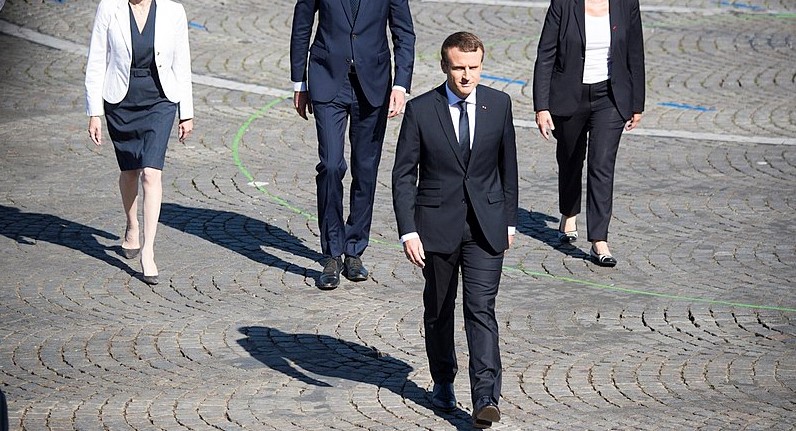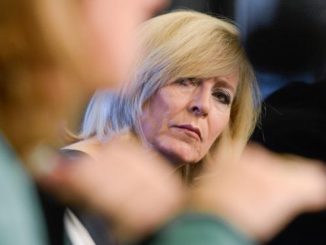 French President Macron gave three main speeches in September, October and February on the European Union, on the food value chain and food consumption, and lastly about the future of farming for new generations. Beyond these top level statements, Samuel Féret gives us his analysis of the new European agricultural policy promoted by Emmanuel Macron. Despite France being the CAP’s leading recipient of financial support, at 12 billion a year on average, President Macron is willing to break taboos and change the narrative about France in the EU.
French President Macron gave three main speeches in September, October and February on the European Union, on the food value chain and food consumption, and lastly about the future of farming for new generations. Beyond these top level statements, Samuel Féret gives us his analysis of the new European agricultural policy promoted by Emmanuel Macron. Despite France being the CAP’s leading recipient of financial support, at 12 billion a year on average, President Macron is willing to break taboos and change the narrative about France in the EU.
Macron, Europe and the method
As former assistant of philosopher Paul Ricoeur, Emmanuel Macron did a “re-assessment of French legacies” according to a heuristic of values faithful to his mentor in philosophy. The idea is to reposition France at the forefront of a reformation of Europe, a European revitilisation.
In so doing, he is respecting his campaign promises of 2017, introducing various socio-economic reforms, while revisiting sectoral policies and commitments in foreign affairs.
His speech on the future of Europe at La Sorbonne in September 2017 made clear his willingness to act as a new leader of the European Union. This showed the magnitude of his reformist ambition locating him as a staunch European. Unlike his predecessors Macron undertook to follow through on his pro-Europe commitment – and in so doing, he has treated the Common Agricultural Policy as a European policy first and foremost, before its being a sectoral policy. And this is the key to the Macron approach – its all about the approach, the method, the place of France in a reformed EU – it’s not about the content of the CAP per se.
Can one imagine a liberal 40 year old President defending the oldest European policy without questioning it to at least some degree? No. He knows that it is not primarily in defending the CAP that he will embody a young and modern leadership. His message is more – let’s defend Europe first. As “President philosopher” Mr Macron does know that the CAP incarnates a (French) tradition, one with a curious circularity – for CAP is a tradition reinvented every five years, supposedly reformed every five years – it is a tradition of the new.
Above all Macron knows how much the CAP is a French passion, albeit one with destructive, path dependency dimensions related to the distribution of subsidies. He knows also that the CAP reform implementation in France is deeply problematic with huge delay of CAP payments under Pillar 1, and Pillar 2 managed by the French regions. None of this augers well for the upcoming EU negotiations on MFF and CAP.
Breaking the taboo of CAP subsidies
Macron did sound a warning shot during his infamous speech on Europe on 26 September. To paraphrase Does our common agricultural policy protect our farmers and our consumers? I look at the last years, I do not feel totally. And we have arrived at this form of paradox where the CAP has become a French taboo while our farmers continue to denounce its operation.
Questioning its intrinsic burden, Macron named the CAP as “an income policy accompanied vaguely by the necessary transitions through complex schemes”. He doubled down and admitted that it was “a policy that we have a hard time explaining to our people”. And therein is this paradox: The CAP house has becoming uninhabitable but remains the common home of European farmers. CAP – common agriculture policy – is both desperately needed and, as presently structured, unable to generate a sustainable future.
With the likely reduction in the EU budget because of the € 12billion annual hole generated by the Brexit, CAP payments are expected to lower. President Macron knows this. Beyond this arithmetic consideration he knows that farmers cannot rely eternally on CAP to get decent incomes and livelihoods. It’s not sustainable for anyone – farmers, France, or the EU.
As he continued to distance himself from past agricultural legacies –including from people and former policies – so he continued to do so with the CAP as well. This distanced but reflexive posture led to a specific and quite pointed statement issued by the European affairs secretariat of the Prime Minister last December. This consisted of a controversial note from French authorities on European policies and MFF. It described the CAP and the cohesion policy as ‘traditional policies’ placing them behind new priorities such as defense, security. Who would say the opposite? First the EU shall protect its citizen, and not a specific worker or entrepreneur category.
However, traditionally France has not been able to take any serious leadership on changing CAP without being considered a usual suspect – and thus very predictable. And it’s unlikely that Macron would rekindle a fire on CAP that would burn his ambition for a better Europe. Macron wants to avoid being isolated on a sectoral policy that is not the core of a future and modern EU, while the EU is so fragile in the face of nationalism and migrations.
Although there’s no official taboo on CAP anymore, French authorities have nevertheless a red line that cannot be crossed: co-financing Pillar 1 expenditures. For French authorities, direct payments shall remain the first safety net for farmers’ income while Pillar 2 is awkward to grapple with because of its co-funding and administrative burden.
The new delivery mechanism is the next CAP reform
The Elysée’ tenant understands that the CAP strategic plan proposed by the European Commission may introduce a significant paradigm shift in the way France has considered CAP reforms so far. Much more than in the content, the next CAP will be built upon a new methodology: the new delivery mechanism, where the national implementation will matter more than the EU talks.
Increased subsidiarity adds to this momentum but the regionalisation of Pillar 2 within France has proven to be an administrative nightmare. In particular, it added to the delay of CAP payments since 2015 due to ineligible areas receiving payments, which in turn created an administrative monster. « We gave farm subsidies that were forbidden, we made a fool of ourselves” Macron said on 23 February in front of young farmers.
In other words, what’s the point of negotiating a strong CAP budget if you do not know how to spend it properly according to the EU rules?
President Macron does believe that each Member state will need enough flexibility to implement CAP at home. As he said in September: “I hope that each country can accompany this transformation according to its ambitions and preferences”. One size does not fit all.
President Macron had already spoken of a more multi-speed EU if some Member states refuse to move together in the same direction. Though the Brexit and the MFF talks will define soon the pace and the magnitude of sectoral reforms, the main challenge about the next CAP will be its national implementation, not its European negotiation.
It is very likely that the next CAP reform will not bring any revolutionary change except to make Member States more accountable about spending EU money. Whether the new delivery model message is somehow ‘Do it yourself member state’, the CAP is much more than a DIY store or a toolbox to prevent crisis in the farming sector. A future national delivery model will bring a new heuristic of values, which could potentially make the CAP more result-oriented – exactly what the farming lobby’s fear as Macron well knows.
The plan is to get a common EU framework that will allow France i) to continue receiving Pillar 1 subsidies fully funded by the EU – even if these funds are at a lower level but better spent and invested. This would avoid the extra EU recovery of sums paid out to France due to errors as happened previously. In essence, the thinking here is that it’s better to spend the EU money you receive under CAP – even if its less – rather than to ask for a more significant envelope you’ll not spend in the end. These will also be used for income support and environmental payments as yet to be determined; ii) to grasp all opportunities offered by the new Omnibus regulation to protect farmers from unfair trade practices and asking for extra flexibilities to support risk management and crisis instruments.
Beyond the CAP: a national bill and bilateral trade agreements
After his election in Spring, Macron launched in the Summer 2017 a public and a farm cross-sectoral consultation called “Etats Généraux de l’Alimentation” which aims at re-valuing farm gate prices and encouraging sustainable food production and consumption. Farm gate prices shall be set according to investment and production costs and shall reward work according to a Macron who really wants to promote work’s supposed emancipatory value.
In addition to the CAP, a complementary agri-food bill would bring to the fore a national narrative on food price fixing, based on farm gate prices and not from retail prices anymore. The lack of competitiveness of French agri-food sectors incl. livestock is a longstanding but unresolved issue that subsidies cannot disguise for much longer.
Finally, new trade agreements such as Ceta and Mercosur, which could offer market opportunities, are also part of the new Macron deal. This new approach was one he tried to convince young farmers of, with a kind of benevolent firmness on 22 February. The implication was clear – openness and trade are key drivers for farming prosperity and cannot be considered only as risks. He did not say – don’t be afraid, the CAP and the national agri-food bill will protect you. And this emphasis – praising commercial openness towards trade, while de-emphasising CAP and national legislation – was noteworthy.
Macron then, is shifting the traditional French approach to CAP somewhat. He has a twofold ambition to modernize public intervention in the agri-food sector, through a renewed although modest EU action. Modest, because Macron is now aware of the intrinsic inertia of decision making, having been in power a short but nevertheless also a long enough time. Modest too, because the revival of Europhobic governments has forced him to dial down his European ambitions.
CAP is a significant instrument for Macron and France, one which he will use to express a different approach to how France is and how it functions in Europe. CAP is no longer the monolith it once was for the French authorities in EU talks while still remaining a cornerstone for the French Ag policy.





